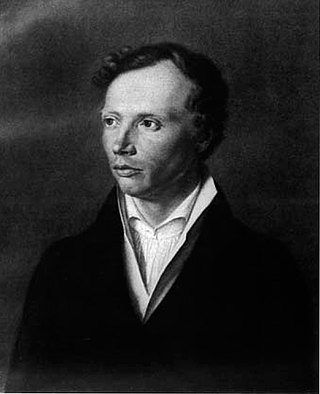
Johann Ludwig Uhland was a German poet, philologist, literary historian, lawyer and politician.

Kindertotenlieder is a song cycle (1904) for voice and orchestra by Gustav Mahler. The words of the songs are poems by Friedrich Rückert.
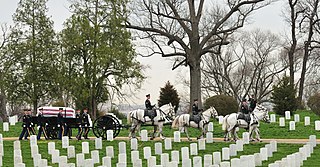
A military funeral is a memorial or burial rite given by a country's military for a soldier, sailor, marine or airman who died in battle, a veteran, or other prominent military figures or heads of state. A military funeral may feature guards of honor, the firing of volley shots as a salute, drumming and other military elements, with a flag draping over the coffin.
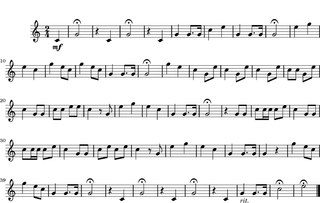
The "Last Post" is a British and Commonwealth bugle call used at military funerals, and at ceremonies commemorating those who have died in war.

The Enemy Below is a 1957 American DeLuxe Color war film in CinemaScope about a battle between an American destroyer escort and a German U-boat during World War II. It stars Robert Mitchum and Curd Jürgens as the American and German commanding officers, respectively. Produced and directed by Dick Powell, the film was based on the 1956 novel of the same name by Denys Rayner, a British naval officer involved in antisubmarine warfare throughout the Battle of the Atlantic.

The German war cemetery of Langemark is near the village of Langemark, part of the municipality of Langemark-Poelkapelle, in the Belgian province of West Flanders. More than 44,000 soldiers are buried here. The village was the scene of the first poison gas attacks by the Imperial German Army in the Western Front, marking the beginning of the Second Battle of Ypres in April 1915.

The German Resistance Memorial Center is a memorial and museum in Berlin, capital of Germany.

PhilippFriedrich Silcher, was a German composer, mainly known for his lieder (songs), and an important Volkslied collector.
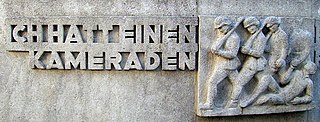
"Der gute Kamerad", also known by its opening line as "Ich hatt' einen Kameraden", is a traditional German anti-war song and soldiers' lament. The lyrics were written by German romantic poet Ludwig Uhland in 1809. Its immediate inspiration was the deployment of Badener troops against the Tyrolean Rebellion. In 1825, the Lieder composer Friedrich Silcher set it to music, based on the tune of a Swiss folk song, in honor of those who fell during the more recent Wars of Liberation against the French Imperial Army of Napoleon Bonaparte.
Volkstrauertag is a commemoration day in Germany two Sundays before the first day of Advent. It commemorates members of the armed forces of all nations and civilians who died in armed conflicts, to include victims of violent oppression. It was first observed in its modern form in 1952.
"Alte Kameraden" is the title of a popular German military march. It is included in the Armeemarschsammlung as HM II, 150.

Conrad Wiene was an actor, screenwriter, film producer and director of Austrian and German silent films. He was the younger brother of German film director Robert Wiene.

Willy Birgel, born Wilhelm Maria Birgel, was a German theatre and film actor.
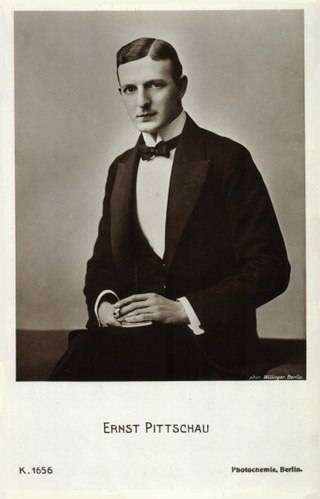
Ernst Pittschau was a German stage and film actor.
Hans Jürgen von der Wense was a German poet, composer, photographer, aphorist and hiker.
I Once Had a Comrade is a 1926 German silent film directed by Conrad Wiene and starring Erich Kaiser-Titz, Otz Tollen and Erwin Fichtner.
The Good Comrade, or I Had a Comrade, is a 1923 German silent film directed by Hans Felsing and starring Willy Kaiser-Heyl, Henri Peters-Arnolds and Margit Barnay. It takes its title from a popular song.
I Had a Comrade is a 1924 German silent film directed by Hans Behrendt and starring Otto Gebühr.
Felix Römer is a German historian who specialises in the history of World War II. He has conducted pioneering research into the implementation of the Commissar Order by combat formations of the Wehrmacht and the attitudes of German soldiers based on the surreptitiously recorded conversations of prisoners of war held in Fort Hunt, Virginia, United States.
The Bundeswehr regulations on traditions (Traditionserlass) are a series of regulations by the Bundeswehr developed in the 1950s that until today with revisions, all in respect to the German military traditions that have had been upheld by its predecessor services before and the traditions in force today by the current service.
This page is based on this
Wikipedia article Text is available under the
CC BY-SA 4.0 license; additional terms may apply.
Images, videos and audio are available under their respective licenses.










